Greetings, and welcome to a captivating exploration sparked by insightful discussions within a LIVE session, which was honed in on the global theme ‘Learning For Lasting Peace’ with a focus topic on: Bridging the learning inequalities of the Nigerian child and youth impacted by social unrest. This engaging dialogue unfolded on Wednesday, the 24th of 2024, aligning with the International Day of Education observance.
Join us as we delve into the heart of these conversations, exploring the nuanced challenges and promising solutions in the pursuit of equitable education. This Panel was made up of the following speakers and professionals at AREAi, namely: Michael Abdullahi, the Chief Development Officer; Agbendeh Sewuese Bertha, the Director of M.E.A.L; and Maureen London, the Programs Manager (DSA), moderated by our Director of Digital Communications, Opeolu Eniola Adeyemi.
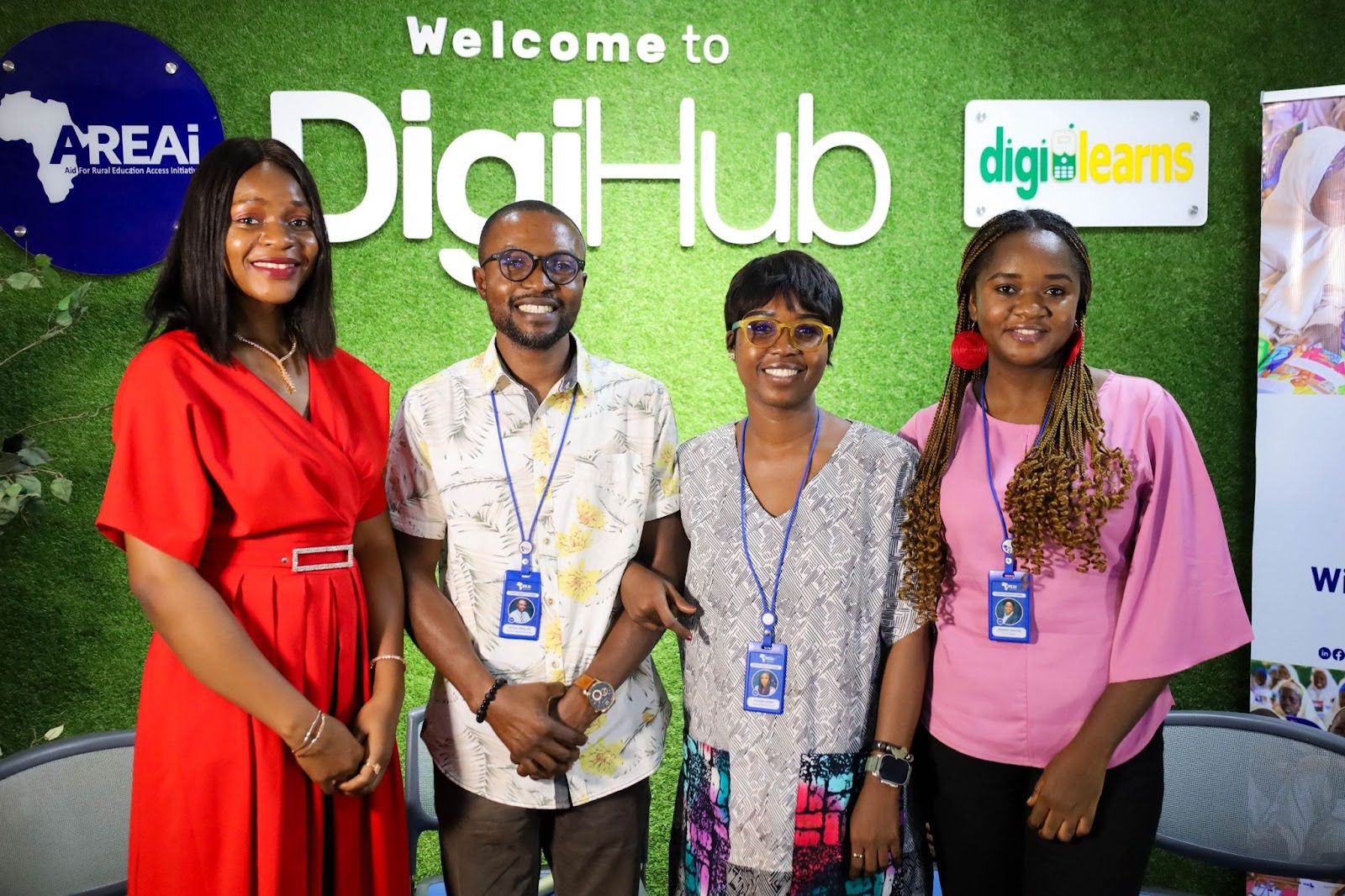
Prepare to embark on an intellectual journey as we unravel the profound insights shared during this sophisticated LIVE dialogue and Q&A session (still available for a rewatch on our Instagram and Facebook Pages). Together, we’ll dissect the role of education as a catalyst for change, addressing societal unrest and fostering resilience among the most vulnerable children, girls, and young women.
Your presence here as a reader signifies a commitment to unravelling the complexities of education in the pursuit of lasting societal harmony. Let the exploration commence.
Happy Reading!
The Dialogue.
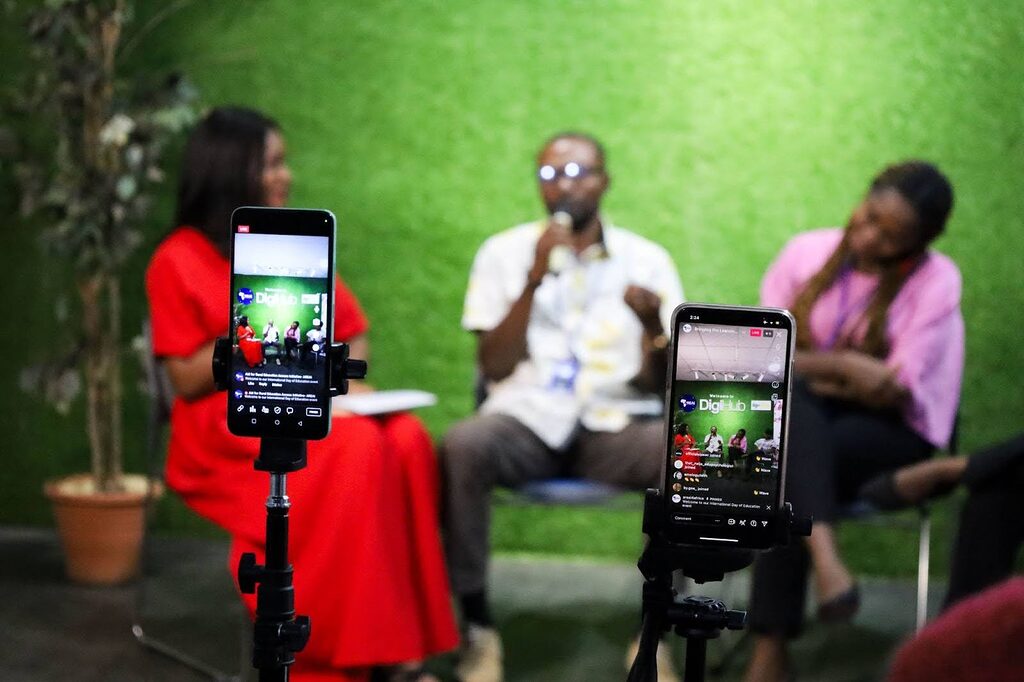
Opeolu: In the context of the International Day of Education with the theme ‘Learning For Lasting Peace’, how do you think education can serve as a powerful tool in addressing and preventing unrest and its vices among the world’s most vulnerable (Children, girls, and young women)?
Michael: Thank you for that question. From my perspective, I believe that empowering children and girls with the requisite skill set and knowledge, such as digital literacy, communication proficiency, and critical thinking ability to be able to analyse information, is the first step because it is only when they can do this that we can then say that education is a formidable tool in confronting this global crisis called conflict.
Opeolu: How do crises and unrest affect children’s response to learning and their right to education?
Bertha: Thank you very much for that important question. I will look at it from this perspective on how crises affect children’s right to education. We can see that with the increased rate of crisis globally, especially in Nigeria, there’s an increased number of out-of-school children deprived of access to education.
They do not have the essential foundational skills to contribute to their country’s economy. So they become vulnerable to exploitation and abuse. Most times, they are susceptible to banditry and other vices. In most cases, even when they have access to education, it is difficult because their proficiency level in literacy and numeracy is deficient, so they need extra support to blend in with their peers as they should.
Opeolu: UNESCO has emphasised the transformative nature of education for peace. How can educational institutions foster values, attitudes, and skills to empower students, especially young women and girls, as agents of peace in their communities?
London: One of the things that will foster peace and inclusivity in schools is the inclusion of gender sensitivity in our schools, which helps to promote women’s values, women’s inclusion, and women’s education. It also brings to light the work that women do; this can help encourage conflict resolution.
Another thing I see is having safe spaces for women where they can thrive and do more. AREAi’s DSA program is a gender-sensitive program that helps tackle the S.T.E.M. aspect of women’s education, which allows them to become employable.
Opeolu: Considering the global rise in violent conflicts, how can international collaboration in education contribute to a more peaceful world?
Michael: It will interest you to note that we at AREAi have been in operation over the years, directly impacting the lives of over one million people across all our intervention educational programs. It is essential to state that this was not done in isolation.
We achieved this through our extensive partnership with global and national organisations such as Malala Funds, TheirWorld, Coca-Cola Foundation, MIT Solve, and the National Commission for Refugees, Migrants, and Internally Displaced Persons(NCFRMI) etc. All of these collaborations exemplify our collective effort to strengthen education as a means of combating conflicts all over the world. In the future, I want to implore you as an individual or as an institution; you cannot fight this alone; you must continue to forge partnerships locally and internationally to be able to achieve global goals.
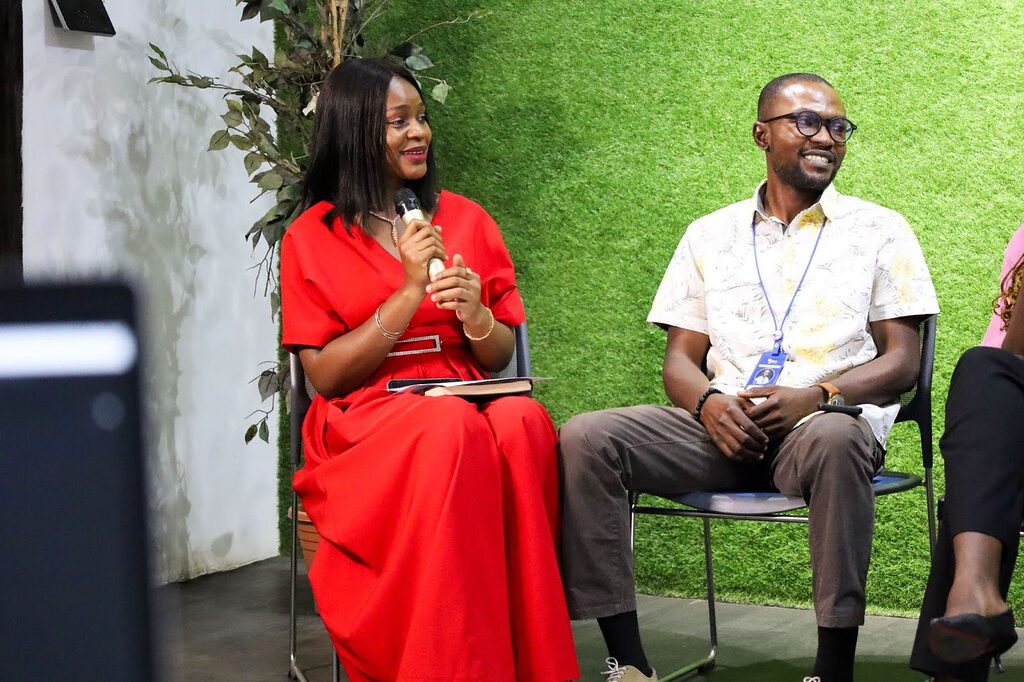
Opeolu: How do you think crises have directly contributed to the alarming number of out-of-school children, and what measures can be implemented to re-enrol these learners, including mainstream learners, after a crisis?
Bertha: As I emphasised earlier, the crisis has continued to increase the number of out-of-school children globally and in Nigeria, and we have seen that in some cases, government institutions, development partners, and even N.G.O.s bring up alternative learning options for these children, but most times it is not sufficient as we can see that the number of out of school children keeps increasing at an alarming rate. For example, the FastTrack program by AREAi, which is indigenously developed, can come in handy. FastTrack is an offline Ed-tech solution that combines the bi-lingual model and teaching at the right level methodology to accelerate foundational literacy and numeracy skills for out-of-school children.
For over three years, we have implemented Fasttrack across several tropical areas and worked with over 18,000 children, supporting them in foundational numeracy and literacy skills. Our independent evaluation shows that the FastTrack methodology, combined with these three methodologies, accelerates foundational skills three times faster than where the solutions are independently implemented. I would suggest that solutions such as FastTrack should be used to bridge the learning crisis because sometimes, even when these children are re-enrolled back into schools, they are not able to perform effectively in numeracy and literacy but with FastTrack as a bridge, it will help them transition seamlessly into formal education.
Opeolu: How long has AREAi been implementing the FastTrack program, and how many camps have the FastTrack solution been implemented in?
Bertha: We piloted FastTrack in 2021 and have been implementing it for over three years; we have worked across 14 IDP camps and refugee centres and reached over 18,000 children.
Michael: To add to the statistics, this program is done extensively across not just Abuja; we are also implementing it in the northeast, Borno, and Makurdi.
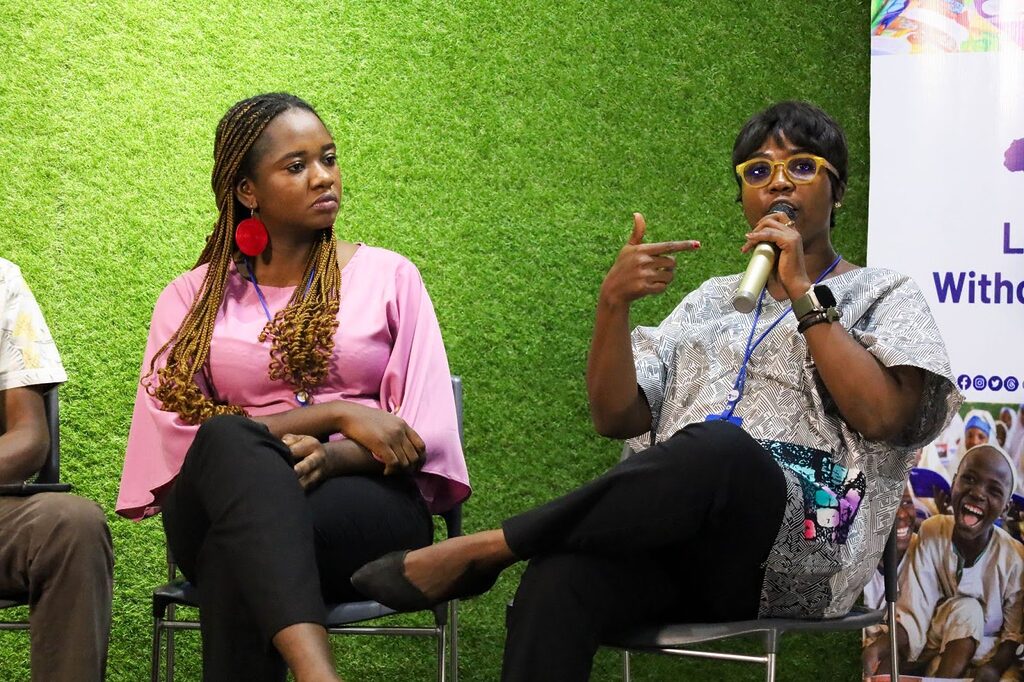
Opeolu: In your opinion, what specific subjects or educational approaches do you think are most effective in promoting understanding, empathy, and peace among diverse Communities?
London: I would like to redirect this back to the Accelerated Learning for Adults (A.L.A.L.) program we had. One of the things that helped us was the peer and educational mentoring program. Here, children rely on each other as some learn faster than others. It fosters peace, promotes team bonding, and helps them to get to know each other better. Another thing that we did was inter-faith and cultural programming, which helps teach learners about each other’s backgrounds and cultures. So, the peer and educational mentoring program is crucial in fostering unity, bridging the gap, and promoting interaction between learners from different cultural backgrounds.
Opeolu: How can individuals demonstrate their commitment to peace using education as a tool in their immediate communities? What suggestions can help the government uphold transformative education policies for lasting peace?
Michael: Individuals can show their commitment to people’s education by championing empathy. Empathy in the sense that you feel concerned for your neighbour, so you won’t want harm to come to that person.
Secondly, you can show or demonstrate an interest in education across all levels by inclusivity. Nothing should be done in isolation, even down to the family unit. We must not make decisions in isolation even if the child doesn’t understand; as the child grows, they begin to understand the importance of making collective decisions, and we can also translate that to our workspaces. For example, the janitor is aware of what is happening in the organisation and can speak for the organisation; that way, we can foster peace.
Thirdly, individuals should share information. There’s a program by the National Orientation Agency called “See something, Say something”. I want to reinvent that to “Know something, Share something” and not hoard information. Everybody becomes aware, and everybody knows what to stand for and against.
To take it further, what can the government and stakeholders do to advance policies to help solve the conflict gap? I want to implore the government of Nigeria to look into drawing inspiration from what we are doing with our Getting Girls Equal (GGE) program. Our girls have made invaluable contributions that emphasise policies that are not just inclusive to promote peace through education effectively. It is not just enough to be inclusive, but we also want to see implementation across local, state, and national levels. That way, we can effectively tackle this menace called conflict and war in our communities.
Opeolu: Just to shed light on what Mr Michael has said, The G.G.E., Getting Girls Equal program is a 3-year initiative that has been running and is still running. Most of the solutions proffered are not just solutions that we developed as an organisation only but have been collectively developed also from these girls, their contributions and what they think because they actually experience some of these challenges, and so those solutions they have proffered as a policy document and reports. Hopefully, we have a Government that is hearing and listening but not just hearing but also implementing because if children and girls and the most vulnerable in our society understand what is going on, and there is clear communication and understanding from the government, a lot of the problems we have regarding crisis, regarding unrest will be solved.
Opeolu: How do you think the FastTrack initiative has so far contributed towards fostering unity and promoting peace among the beneficiaries in the different rural communities we have worked in? Is there a ripple effect and a shift in perspective from these children?
Bertha: I’m delighted to speak on this because we have had many conversations with these learners and heard some of their stories. From our experience of implementing FastTrack, we have seen that beyond just the foundational skills that we are delivering to these children, FastTrack is generating secondary outcomes; we have witnessed learners who have shifted perspectives from not having aspirations for the future, just like the case you have also raised about a child wanting to be a soldier because he wants to take revenge or something.
We have also had stories of children testifying that they want to be soldiers to protect their communities. Beyond just revenge, they have seen the crisis’s effect on them, their community, and their education, and they do not want other children to go through the same things again. So they are shifting perspectives from not doing what they want to be in the future, not having plans at all, to wanting to be soldiers and be doctors to provide treatment to children with illnesses so they can participate in school programs effectively.
The nature of FastTrack also ensures that these children are divided into clusters at their learning levels, which helps them to work within groups. So, it has enabled them to develop competency and leadership skills to learn how to share and support each other to ensure peace.
The Ed-tech component of our methodology is called the Mavis Talking Books and Pen. So, when put into clusters, the children share the Mavis Talking Book and Pen. It would help if you learned how to share to learn within these clusters, so the FastTrack program also teaches them to learn to share and solve misunderstandings among themselves. Also, we are in the process of conducting a more detailed assessment of the secondary outcomes of FastTrack on our learners. When that is done, we will share the feedback and learning experience with the general public.
Opeolu: Beyond teaching them foundational skills in literacy and numeracy, FastTrack has also been helping these children dream more, have new dreams and aspirations, and have new goals that are more positive and promote knowledge. From all their experiences, we can tell that this initiative is impacting not just their educational aspirations but also their social life.
Opeolu: UNESCO has dedicated this year’s International Day of Education to the role of education and teachers in countering hate speech. How can teachers actively contribute towards creating a more inclusive and tolerant learning Environment?
London: One of the things teachers should do is use inclusive language. If a teacher is positive about some things, such as what she says in the classroom, the students will pick up things from the teacher because they learn from what the teachers do. When we have training with teachers, one of the things we do is to have inclusive language where they cut out some words they shouldn’t say in the presence of the children during program delivery.
Another thing is intercultural exchange. I will cite an example of what happens when we go for advocacy meetings in these communities; you find out that, at times, they want to entertain you, make you feel at home, or try to give you something (gifts) when you go there. In doing this, you also try to know about these people’s culture; you try to put yourself in their shoes. It creates that intercultural exchange where you learn new things from this person.
Most of our teachers may be from somewhere else other than these communities, but they will understand the culture of the people they teach. So I feel intercultural exchanges can also help counter hate speech because when I know what a people’s culture is about, I tend not to say things that will trigger them; I tend to flow in line with what the culture around them says; also, I have cultural awareness training, so when I’m in a place where they’re celebrating such cultures in that community, I tend to flow and be part of that culture.
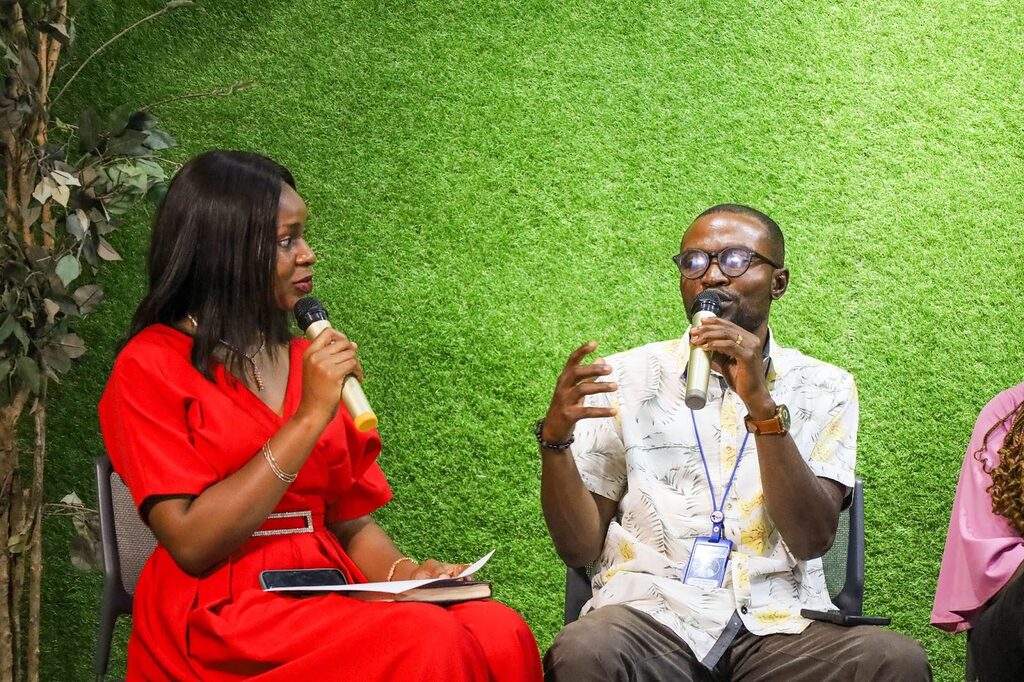
Opeolu: How do you think the educational system in Nigeria can build, protect, and sustain peace before, during and after a crisis?
Michael: Thank you. It’s a sad thing that has happened in Oyo State recently, and our prayers are with those whose families were affected. However, I want to state that the Nigerian educational system is crucial to building, sustaining, and nurturing people during a crisis. How can we achieve that?
I want to highlight three things from my own personal and professional journey. If we incorporate it into the current practice, it can help us. One is to integrate conflict resolution into our existing primary school curriculum upward. So that everybody becomes an expert, even from a tender age. By the time you go to the university, you will know how to resolve conflict among yourself, your friends, and your peers, regardless of age, because everybody experiences conflict at every age. When we integrate conflict resolution into our curriculum, it will go a long way.
Secondly, the government should ensure equal access to quality education. Equal access, not just education, because you can provide education and all: you have a job, a class, a hall, and no chair, so people must be comfortable, and the rooms must be convenient for learning. So, regardless of whether you’re from the North or the West, everyone should have access, regardless of ethnicity, religion, tribe, or whatever it is.
Thirdly, the government of the day, or whoever will come in in the next administration, should encourage community engagement because this is a critical process that can be built on. Most often, policies are designed for people who have yet to be involved in the design process. Contextualised design and policy designing, because you cannot create a policy for me, say, you’re bringing equal access, getting the best of education and then excluding the people eligible to teach within the community and instead bringing foreigners to teach, that can result in conflict.
Yes, I’m not going to get into details, but we have had similar experiences where people would say things like, “Why are you bringing teachers when we have graduates here?” Who can do these things right? So, we must encourage the practice of community engagement, and when we do this, education will become the beacon of resilience. Thank you.
Opeolu: It is important to note that even here at AREAi, we ensure that we integrate teachers from communities during some of our implementations across IDP camps and schools. So, we have something called community-based facilitators. These people have been instrumental in ensuring that our programs are ongoing. They’re in touch with these kids. They know who they are, and if issues arise, they are resolved peacefully instead of by an external person. So that’s so instrumental.
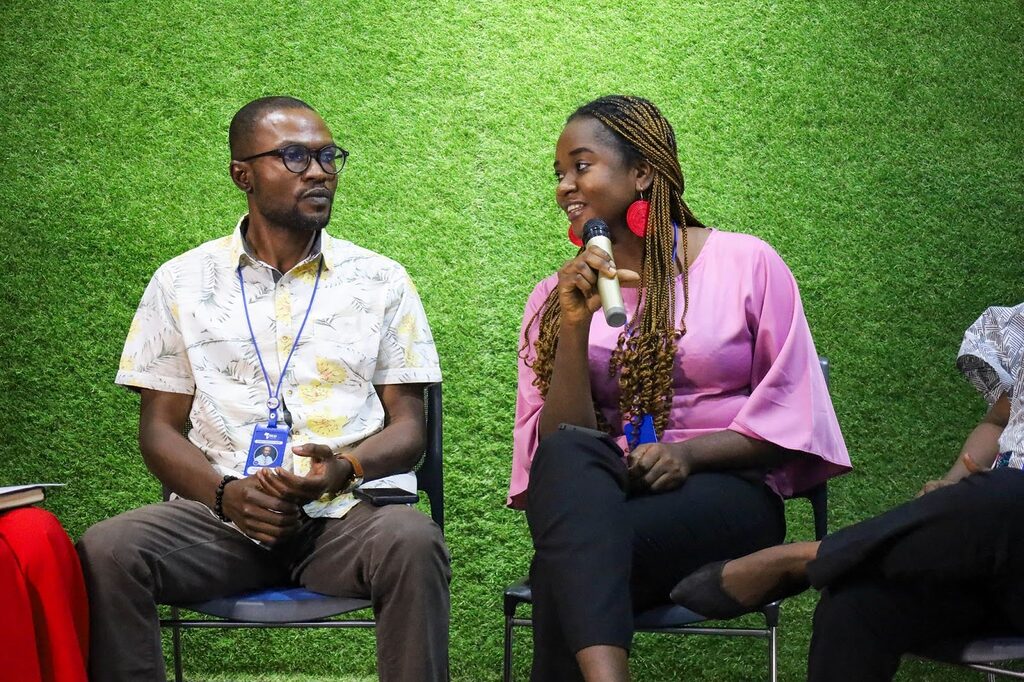
Opeolu: Do you think interventions are enough to solve educational problems caused by crisis and unrest, including school attendance, retention, and the sense of safety, amongst others?
Bertha: Thank you for asking my very last question. At the same time, we appreciate interventions provided by development partners, government agencies, and NGOs, but we can only depend on these interventions. Just like you said, they are just for some time. So when they phase out, what happens?
So that is where our government comes in because the crisis brings school closures; for example, in Nigeria, we now have more than 655 schools that have been shut down, so what happens to children attending these schools or children in those communities? So, the government must collaborate with security agencies to ensure that the security of every Nigerian citizen is upheld.
Just like Mr Michael emphasised working with communities, it is imperative that even during the intelligence gatherings, the government works with the communities because, most times, these things are done at a higher level. They need to see what’s happening at the grassroots, and some of these crises stem from the grassroots. So the intelligence gathering can ensure that the grassroots is also involved. Also, we see what is happening at the grassroots level, so the lives of every citizen are essential, even at the grassroots level, and must be protected to ensure that our children and teachers are comfortable within school systems. So, this collaboration with security agencies will also help uphold peace.
Nigeria’s government should also increase educational budgetary allocation. This can be channelled into infrastructural development. As Mr Michael said, we can have classes, but they will not be conducive to learning. So, aside from infrastructure development, there is also a need for teacher recruitment. This is because some of these schools are understaffed. There should also be provision of materials such that even when children are displaced and move to other locations, the existing structures can accommodate them.
Lastly, I will also recommend increased collaboration with development organisations such as AREAi and other international organisations to ensure that quality education is upheld in all its ramifications. Thank you.
Opeolu: How do you think teacher empowerment can be further strengthened to impact and influence young minds as peace agents for healthy co-existence and relations with others?
London: Thank you. One of the ways we can do this is by celebrating and being aware of our teachers. Being aware of what they bring, we should share the success stories of these teachers with others. If someone has done well, celebrating that person is the right thing. It helps motivate them, makes them feel valuable, thinks they are doing something, and will give you their best. They will influence more; they will go out of their way to ensure that whatever resources you provide them, they make good use of them.
Programs like that should be carried out. For example, when somebody does well and it’s being documented, we can use those documentaries or videos to motivate others. For example, showcasing a school where we have recruited a teacher, and enrolled a child who is growing and doing more. When they see such videos, they feel motivated. They will always think, ‘I can take my class to another level if I do this”.
It also helps to have exchange learning in different environments.
Another thing that would help promote this is making resources available for them. Resources on resolving conflicts and having a library with stories and histories they can visit when they need help. We don’t know everything, and most times, we work in remote areas where we don’t have internet accessibility. So, a book or a library should be built, donated, or placed in the schools where teachers can have resources to help teach these students.
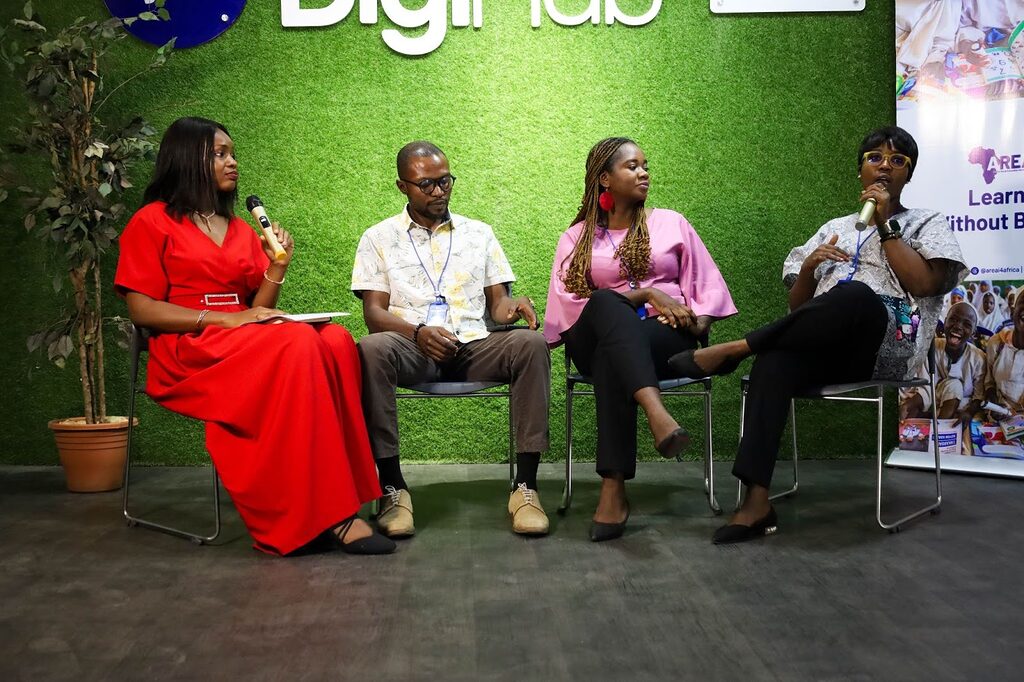
Opeolu: Can you shed more light on the teachers’ training we had last year? How do you think that was impactful?
This is because we organised the teachers’ training in Oyo state across 30 schools from three senatorial districts in Oyo. So what do you think about that? We also got straightforward feedback from some of those teachers and others who saw the program.
Can we do more? Should we do more this year? And how do you think that program impacted the lives of teachers because we’re not just speaking in isolation? These teachers we’ve worked with helped us in some of our programs, especially the G.G.E. We had a training last year with them. How did that program impact them, and have you seen some benefits from the training we have?
London: I was part of the training, and it was exciting because teachers are excited because you also get to learn new things. You may feel you know it. But once you come to those trainings, you know that you must learn to unlearn. Like, you have to know that we have to be gender sensitive. It just made sense to them that whatever they do or whatever they are doing, as this program is concerned, they have to be gender sensitive.
They have to have this inclusive language when They are teaching. For instance, I have this mindset of understanding my students’ different and diverse cultures and beliefs to help me foster peace and have a harmonious class where all my students will be attentive and contribute. It was indeed a good one, and teacher training is good, as it helps refresh your memory on what you know and should know.
Bertha: I want to add something; when we were conducting the needs assessment with the schools in Oyo still on the G.G.E. program, and we spoke with some of the teachers that were part of the S.B.M.C.s (School Management Board Committee), they made comments about teachers because we brought some sessions we discussed about teachers training, the need for teachers training. So we saw that there was a massive gap in teachers’ training.
You’ll see that most teachers benefiting from those teachers’ training were mostly the science teachers teaching math or science subjects. So we saw that some other teachers were just left out. They didn’t benefit. They needed to be able to update their knowledge and some of the tools they used. So, they were agitating for more inclusive teacher training.
This is a recommendation for stakeholders who are also listening to this LIVE program.
Also, when organising some of these teacher training, they should ensure that the selection of participants is as inclusive as possible. Since we support the adoption of S.T.E.M., we should also ensure that other fields and sectors are included, as they are critical in developing children and society. So, for these teachers to communicate and deliver to these children effectively, they must also update their knowledge as often and as much as possible. So, the selection should be inclusive.
Michael: Before you do the close-out Opeolu, I want to emphasize this slogan we use here. “We are creating a world where the future can thrive. You are that future. I am that future”. So, it takes our collective effort because the future cannot succeed without peace. So it is your responsibility to ensure that we have a peaceful world.
Opeolu: So, for every teacher listening, if you’re here, please know that you are valued and appreciated, and we’re advocating for you. We know that you do great work.
We understand that all of your efforts are geared towards shaping the future of our country, of countries across the world, and the lives of children in your care. Also, know that your work is not in vain.
So we’re hopeful that all of the policy recommendations from organisations like ours at AREAi here, and also other essential partners, stakeholders, and N.G.O.s interested in education, we are hoping that all of those policies and recommendations do not just remain on paper. That they are implemented and become realities you participate in and benefit from. So we are hopeful.
Thank you for joining us on our LIVE session today till next time.
Bye.
